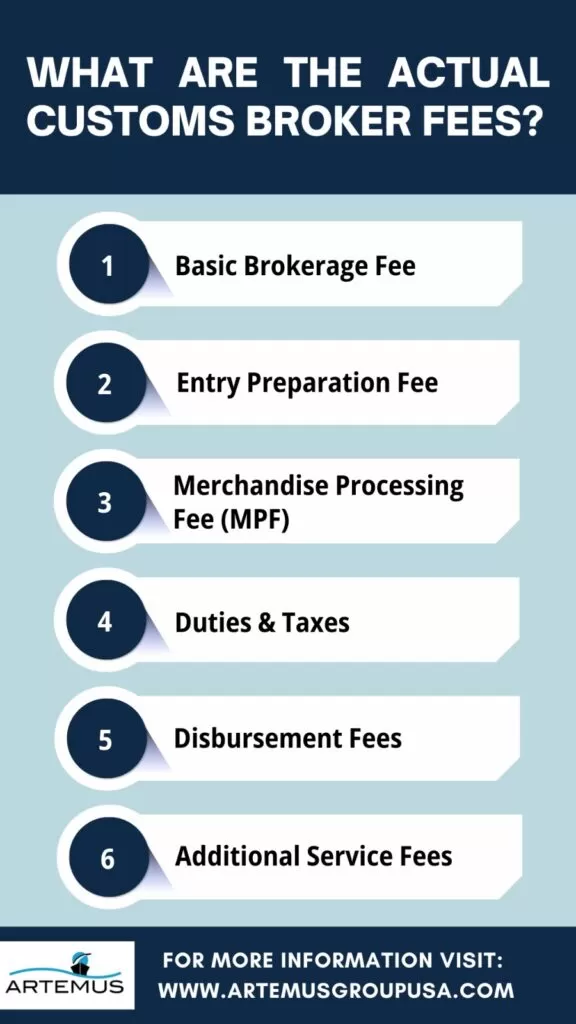
How To Import A Car From Japan To USA? A 7-Step Process
Are you dreaming of importing a car from Japan but feeling overwhelmed by the process? Look no further! In this

When it comes to international trade, the role of customs brokers is indispensable. These professionals are experts in navigating the intricate web of customs regulations, ensuring your goods move seamlessly across borders. However, availing of their services comes with a cost, and understanding custom broker fees is essential for businesses engaged in global commerce.
In this comprehensive guide, we’ll delve deep into the world of custom broker fees, demystifying the various charges and shedding light on factors that influence them. But that’s not all – we’ll also introduce you to Artemus, a trailblazing solution in the customs brokerage industry.
Artemus Transportation Solutions offers not just custom broker software but a suite of services, including insurance estimates and real-time shipment status checks, empowering importers and exporters to streamline their operations and navigate customs with ease. Let’s embark on this journey to unravel the intricacies of custom broker fees while discovering how Artemus can be your trusted partner in international trade.
Table Of Contents

The actual customs broker fees can vary widely depending on several factors, including the customs broker you choose, the complexity of the importation process, and the specific services you require. However, as a rough estimate, the basic brokerage fee charged by customs brokers for standard services typically ranges from $50 to $150 or more per customs entry.
Here is an overview of the various components of customs broker fees, including the basic brokerage fee, entry preparation fee, merchandise processing fee (MPF), duties and taxes, disbursement fees, and additional service fees:
The basic brokerage fee is the core charge for a customs broker’s services. It includes tasks such as document preparation, customs declaration submission, communication with customs authorities, and ensuring compliance with import regulations. The cost of the basic brokerage fee can vary significantly among customs brokers, and it’s often negotiable. It can range from $50 to $150 or more, depending on the broker and the complexity of the clearance.
Customs brokers may charge an entry preparation fee for their work in preparing and submitting the necessary documentation to Customs and Border Protection (CBP). The complexity and volume of documentation required can influence the cost of this fee. This typically ranges from $50 to $100 or more.
The MPF is a fee imposed by the U.S. Customs and Border Protection on most imports entering the United States. It is calculated as a percentage of the declared value of the merchandise, with minimum and maximum fee amounts. It’s generally 0.3464% of the entered value of the goods, with a minimum fee of $26.22 and a maximum fee of $519.76 per entry. While it’s not a customs broker fee, brokers may include it in their service and facilitate its payment on behalf of the importer.
Duties and taxes are expenses associated with importing goods and are not customs broker fees. However, customs brokers can assist in calculating these costs and facilitate their payment to the appropriate authorities on behalf of the importer.
Customs brokers may charge disbursement fees to cover their expenses for paying duties, taxes, and other related fees on your behalf. These fees can include handling charges and, in some cases, interest if the broker advances funds to cover these expenses before you reimburse them. They fee to cover these expenses, which typically range from $15 to $50.
Customs brokers may levy additional fees for specialized services or unique circumstances. These extra charges can encompass storage fees, inspection fees, or fees related to specific documentation requirements. The type and amount of additional service fees can vary widely among customs brokers.
Related: How To Get A Customs Bond In 5 Easy Steps: Beginner’s Guide
Customs broker fees vary based on factors like the type of goods, their value, documentation requirements, and geographic location. Understanding these influences is crucial for importers to budget effectively for customs brokerage services.
The complexity and nature of the imported goods play a significant role in determining customs broker fees. Some products, such as hazardous materials or perishable goods, may require specialised handling, documentation, and permits. These additional requirements can result in higher fees as the customs broker needs to navigate the intricacies of regulations and ensure compliance.
The declared value of the imported goods directly impacts customs broker fees. Customs brokers often charge a percentage of the merchandise’s declared value as their fee. Therefore, higher-value shipments will incur higher fees. Importers need to accurately report the value of their goods to customs to avoid penalties and ensure accurate fee assessments.
Related: From Start To Finish: How To File AMS For USA Shipments?
The volume and complexity of required documentation can affect customs broker fees. Importers must provide various documents, including invoices, bills of lading, permits, and certificates of origin. Customs brokers may charge more if extensive documentation is needed, as they are responsible for preparing and submitting these documents to customs authorities. Additionally, customs brokers must ensure compliance with import regulations, which may involve extra time and effort.
The location of the customs broker’s office relative to the port of entry can influence their fees. Brokers located in major port cities or regions with high import traffic may have a different fee structure than those in less busy areas. In some cases, proximity to customs authorities and familiarity with local regulations may lead to more competitive pricing.
Related: When Is A Customs Bond Required? Key Factors To Consider
Understanding customs broker fees is crucial for various reasons:
1. Cost Management: Importing goods involves various expenses, and customs broker fees can be a significant part of that. By understanding these fees, importers can create accurate financial plans and allocate funds accordingly. This helps prevent financial surprises, ensuring that they have the necessary resources to cover customs brokerage costs while maintaining a healthy profit margin.
2. Compliance & Accuracy: Accurate reporting of the value of imported goods is critical to compliance with customs regulations. Knowing the fees associated with customs brokerage encourages importers to provide precise information, reducing the risk of customs audits, fines, or penalties. It promotes adherence to legal and regulatory requirements, fostering a positive relationship with customs authorities.
3. Service Evaluation: Different customs brokers offer varying levels of service and have different fee structures. Understanding these fees allows importers to make informed choices when selecting a customs broker. They can evaluate the services offered, compare costs, and choose a broker that meets their specific needs while staying within their budget.
4. Transparent Transactions: Clarity regarding customs broker fees enhances transparency throughout the importation process. Importers and customs brokers can have clear, mutually agreed-upon terms, reducing the potential for misunderstandings or disputes related to fees and services. This transparency fosters a collaborative and efficient working relationship.
5. Profitability & Decision-Making: An in-depth understanding of customs broker fees enables importers to assess the overall profitability of international trade ventures. By factoring in all associated costs, including customs brokerage, importers can make data-driven decisions about sourcing, pricing, and inventory management. This informed decision-making process can contribute to the long-term success and sustainability of their business.
Related: What Is A Customs Bond? A Guide For Importers & Others
Customs brokers provide a range of services to facilitate the smooth and compliant importation of goods into a country. These services typically include:
Related: ISF Filing Process: A Detailed Step-By-Step Guide
Importers are not always legally obligated to hire a customs broker. In many countries, they have the choice to handle customs clearance themselves. However, there are scenarios where using a customs broker is highly advisable.
For complex or regulated goods and when dealing with specific trade agreements, customs brokers’ expertise can ensure compliance and streamline documentation, expediting the import process. While not mandatory, engaging a customs broker can simplify imports, reducing errors and delays. Importers should assess their needs to determine if a customs broker is advisable for their situation.
Related: Customs Bond Renewal: All Facts You Need To Know
Custom broker fees are not typically regulated by a single set of global or national regulations. Instead, they are determined through contractual agreements between the customs broker and the importer or client. However, there are some key principles and considerations that influence how customs broker fees are determined and charged:
Related: When Does ISF Need To Be Filed? Know The Deadline
Artemus is the premier customs broker software, simplifying and streamlining the complexities of customs brokerage. Trusted by customs brokers and importers alike, Artemus offers a comprehensive toolset for efficient and compliant import processes. From customs clearance to duty calculation, documentation management, product classification, valuation support, and compliance guidance, Artemus covers it all.
What makes Artemus stand out is its user-friendly interface catering to users of all levels of expertise. Its advanced capabilities ensure precision in customs procedures, helping users navigate intricate regulations and documentation with ease. For those in need of dependable and efficient customs broker software, Artemus consistently delivers simplified solutions and peace of mind.
Related: ISF Bond Cost Breakdown & Management For Import Success
Importers and exporters need customs brokers to navigate the complexities of international trade and ensure compliance with customs regulations.
Customs broker fees typically start with a base charge of around $40 and can vary between $200 to $400 or more, subject to economic conditions.
One disadvantage of using a customs broker is the additional cost involved, as their services come with fees. Another potential drawback is that some businesses may feel a loss of direct control over the customs clearance process, relying on a third party for compliance.

In conclusion, understanding customs broker fees is paramount for importers and exporters navigating the world of international trade. While these fees can vary based on factors such as the type of goods, their value, and the services required, they play a crucial role in ensuring efficient customs clearance and compliance. By grasping the nuances of customs broker fees and considering the factors that affect them, businesses can streamline their import processes, avoid unexpected costs, and ultimately foster successful international trade ventures.
Related: Late ISF Filing: What To Do If Missed The Deadline?

Are you dreaming of importing a car from Japan but feeling overwhelmed by the process? Look no further! In this

Interested in pursuing a career as a freight broker but unsure about the associated costs? Look no further! From licensing

Embarking on a career as a freight broker can be an exciting venture into the world of logistics and transportation.
Get In Touch
Artemus’ Software Solutions for ISF, AMS, Japan AFR, eManifest Canada, & Panama B2B filings.